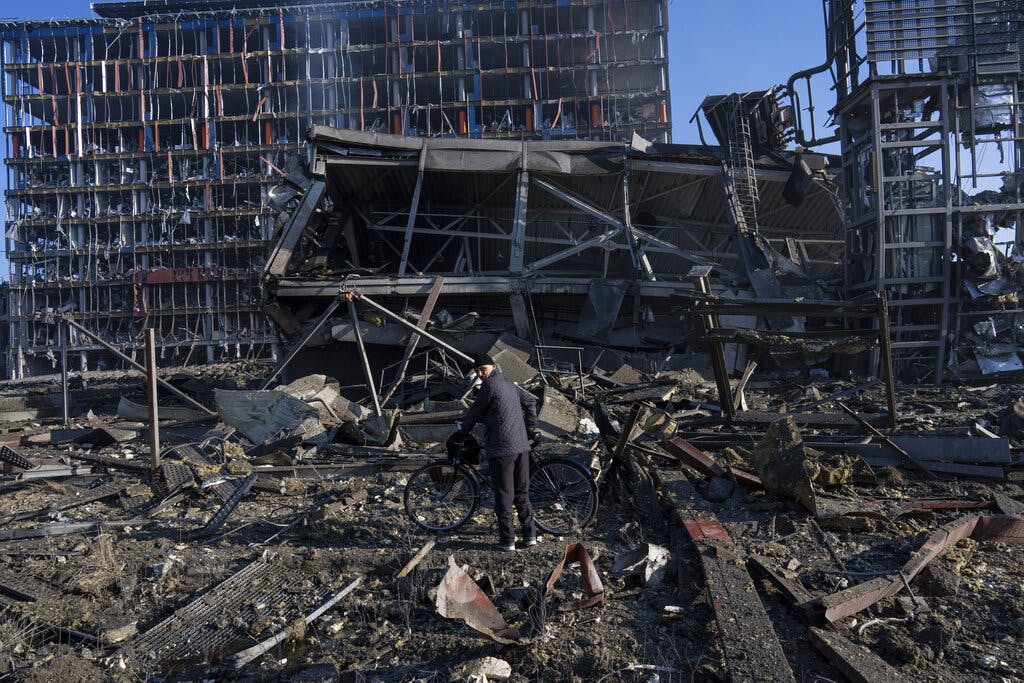Mariupol Spurns Moscow’s Surrender Order
With no shortage of punditry and postulation over Vladimir Putin’s anticipated next moves, it’s interesting to note the perspectives of some who are closer to the theater than those in Washington or Whitehall.

ATHENS — If the Kremlin equated the advent of spring with a hope for Mariupol’s quick capitulation then it will be sorely disappointed, for the besieged Ukrainian city has refused to surrender today.
The Ukrainian national news agency, Ukrinform, reported that the Russian Ministry of Defense sent an official letter to Ukraine containing an ultimatum that “Ukrainian defenders must lay down their weapons and withdraw from Mariupol, and only under such conditions will the evacuation of civilians be possible,” and that Ukraine rejected it.
There was speculation in some European media Monday morning that the heavy bombardment of a shopping center in Kiev overnight, in which at least eight people were killed, may have been a deliberate escalation by the Russians following Marioupol’s refusal to surrender.
A Ukrainian official with the provisional title of deputy prime minister for reintegration of the temporarily occupied territories, Iryna Vereshchuk, said there were “eight pages of revisiting history and other delusional things. They [the Russians] sent the same letter to the UN and the International Committee of the Red Cross and hoped that international organizations would react and start exerting pressure on Ukraine. This didn’t happen. ICRC and UN understand that this is Russian manipulation, and that this is hostage-taking.”
Ms. Vereshchuk said that there could be no question of surrendering or laying down weapons, and told another Ukrainian newspaper that she wrote back to the Russians, “Instead of wasting time on eight-page letters, just open the corridor,” a reference to an ongoing request for Russian troops to open a safe route for civilian evacuations.
In the meantime, emerging reports of forced evacuations of citizens to a location in Russia could not be independently confirmed, Los Angeles Times said, “given that few journalists or humanitarian aid workers have been able to enter Mariupol, where machine-gun battles rage daily between Russian forces and Ukrainian defenders.” While the Kremlin has not responded to such allegations, the article adds that Russian state media reported that buses filled with what they described as refugees have been arriving from Ukraine in recent days.
On Sunday night, the last remaining European diplomat in Mariupol, the Greek consul Manolis Androulakis, arrived in Athens and gave a compelling account of the destruction he witnessed in recent weeks, saying the city that before Russia’s invasion had been an economic powerhouse for Ukraine was now synonymous with Guerica, Grozny, and other cities wrecked by war.
With no shortage of punditry and postulation over Vladimir Putin’s anticipated next moves in the country he seems hellbent on making his own, it’s interesting to note the perspectives of some who are closer to the theater than those in Washington or Whitehall.
A foreign affairs analyst, Alexandros Despotopoulos, speaking on a news show from Greek state broadcaster ERT, said that regarding talks about a possible truce, “the Russians are not actually negotiating” but rather are “gaining time to complete their military operations, until the fall of Odessa and — most importantly — Kiev, to negotiate from a position of power.” That assessment, shared by some in the British defense establishment, contradicts a Wall Street Journal report that cites an unidentified American official claiming that Moscow is actually deprioritizing the capture of Kiev in what is shaping up to be a protracted military campaign in Ukraine.
Speaking of Odessa, on that same program a Greek lieutenant general, Giannis Krassas, said: “If an amphibious operation is carried out in Odessa by the Russian fleet — six amphibious vessels, which have a total carrying capacity of 40 tanks and 2,000 marines — they will need the assistance of the Russian ground forces,” which in the general’s estimation fall short numerically of what would be sufficient to mount a successful operation.
Suggesting that situations similar to Mariupol, where it took more than three weeks for Russian troops who had been bombarding the city to actually enter it, could play out in other Ukrainian cities, Mr. Krassas said that “the Russians will pay very dearly for every meter of land they occupy.”
Whatever Mr. Putin’s ultimate military gameplan turns out to be, it’s clear that — from street fighting in key cities to hit squads on the top Ukrainian leadership — the Kremlin is aiming high and low.
Citing Ukraine’s Intelligence Directorate, the Jerusalem Post reported that more mercenaries connected to the Russian private military company Wagner arrived in Ukraine on Sunday with the objective of assassinating top Ukrainian military and political leadership. The main targets of the mercenaries were said to include President Zelensky, the presidential chief of staff, Andrii Yermak, and Prime Minister Denys Shmyhal.
Whether apocryphal or not, Mr. Zelensky has appeared unphased as he continued what the Jerusalem Post’s Lahav Harkov termed his “virtual tour of Western parliaments” with a speech to Israel’s Knesset yesterday — but his evocations of the Holocaust did not sit well with some Israelis. After the address, delivered via video, the Israeli communications minister, Yoaz Hendel, tweeted, “I appreciate the President of Ukraine and support the Ukrainian people in heart and deed, but it is impossible to rewrite the terrible history of the Holocaust,” adding: “Genocide was also committed on Ukrainian soil. The war is terrible, but the comparison to the horrors of the Holocaust and the final solution is outrageous.”
Should an assessment by the British defense ministry that Russia’s sights are set firmly on Kiev and that “attempting to encircle” the capital in the coming weeks is a top priority prove correct, Mr. Zelenky’s rhetorical missteps could shape up to be the least of his concerns.

